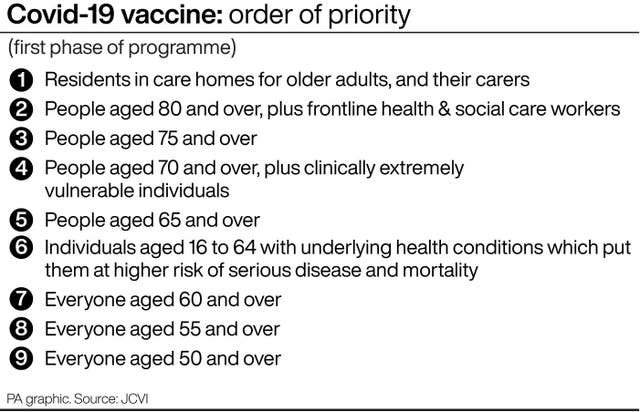
The first Covid-19 vaccine may have received UK regulatory approval, but senior scientists warn this is not the end of the road for safety checks.
Dr June Raine, head of the Medicines and Healthcare products Regulatory Agency (MHRA), insisted “no corners were cut” in the approval process, but monitoring will continue as the jab from Pfizer and BioNTech is rolled out.
Speaking at a Number 10 briefing, Dr Raine said there would “of course” be long-term follow-up data of the vaccine through two mechanisms.
Firstly, recipients of the vaccine can report any side effects they experience via the MHRA’s existing Yellow Card scheme found on its website.
The scheme can be used to report adverse reactions to any drug or vaccine, as well as drugs that are not seemingly manufactured to an acceptable standard, or medicines that a user suspects to be fake.
It is also used to report faulty medical devices.
The scheme flags up “previously unidentified hazards or side effects” to the MHRA that can then undertake further work to get to the bottom of the issue.
In guidance on its website, the MHRA says: “If a new side effect is identified, information is carefully considered in the context of the overall side effect profile for the medicine, and how it compares with other medicines used to treat the same condition.”
It states only in “rare circumstances” is a drug or vaccine that has been approved by the MHRA removed from the market.
In addition, Dr Raine said members of the public will be invited to join an active monitoring programme specifically set up to gather long-term data on the Covid-19 vaccine.

“Many (people) will get a letter,” she said.
“It will be by random allocation, inviting them to join this, so please help us to continue to build that body of knowledge about this vaccine.”
Dr Raine said the existing data used to approve the vaccine was “very robust”.
Professor Sir Munir Pirmohamed, of the Commission on Human Medicines Expert Working Group (CHM), said: “Those that had adverse effects, they were mild and short-lasting, usually lasting only a day or two – similar to the effects you get after any other vaccine.”
About 40,000 people were involved in the vaccine trials, with half receiving the vaccine and half receiving a placebo.
The Joint Committee on Vaccination and Immunisation (JCVI) also states in its guidance that the new vaccine “appears to be safe and well-tolerated, and there were no clinically concerning safety observations”.
Another challenge for the long-term monitoring process is gathering data on vaccine coverage, particularly among poorer communities and people in high-risk groups.

In advice submitted to the Government on how to prioritise different groups for vaccination, the JCVI said in reviewing data it would focus “on inequalities, and the impact of actions being undertaken to mitigate inequalities”.
The Drug Safety Research Unit, an independent body conducting post-market drug safety studies, welcomed the vaccine’s approval but warned it is a “milestone in the development of the vaccines, not the end of the process”.
The unit said: “Post-authorisation safety studies must be fully transparent, report quickly in as near real time as possible and be conducted independently rather than by the vaccine manufacturer.”
It emphasised the importance of “spontaneous reporting” of side effects, and of patients and healthcare staff knowing how to use the Yellow Card reporting system.
The Drug Safety Research Unit is planning to conduct its own active surveillance study on the Covid-19 vaccine.


Why are you making commenting on The National only available to subscribers?
We know there are thousands of National readers who want to debate, argue and go back and forth in the comments section of our stories. We’ve got the most informed readers in Scotland, asking each other the big questions about the future of our country.
Unfortunately, though, these important debates are being spoiled by a vocal minority of trolls who aren’t really interested in the issues, try to derail the conversations, register under fake names, and post vile abuse.
So that’s why we’ve decided to make the ability to comment only available to our paying subscribers. That way, all the trolls who post abuse on our website will have to pay if they want to join the debate – and risk a permanent ban from the account that they subscribe with.
The conversation will go back to what it should be about – people who care passionately about the issues, but disagree constructively on what we should do about them. Let’s get that debate started!
Callum Baird, Editor of The National
Comments: Our rules
We want our comments to be a lively and valuable part of our community - a place where readers can debate and engage with the most important local issues. The ability to comment on our stories is a privilege, not a right, however, and that privilege may be withdrawn if it is abused or misused.
Please report any comments that break our rules.
Read the rules hereLast Updated:
Report this comment Cancel